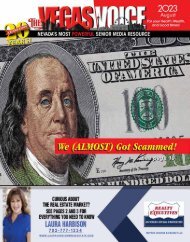You also want an ePaper? Increase the reach of your titles
YUMPU automatically turns print PDFs into web optimized ePapers that Google loves.
WE TRAVEL SO<br />
THE FLU DOESN’T<br />
RECEIVE URGENT CARE AT HOME<br />
REQUEST CARE:<br />
702-848-4443<br />
LEARN MORE:<br />
DispatchHealth.com/flucrew<br />
WE ACCEPT MOST<br />
INSURANCE INCLUDING<br />
MEDICARE & MEDICAID<br />
January 10, 1776<br />
By: John Beilun / Time Traveler<br />
On January 10, 1776, seven months before<br />
the Declaration of Independence, a minor<br />
Philadelphia printer published an anonymously<br />
written 48-page pamphlet. He did not expect many sales, so the edition<br />
was of a limited quantity.<br />
How wrong the printer was! 120,000 copies were sold by the end of<br />
March - plus another 400,000 before year end. On a per capita basis<br />
(the colonies contained only 2,000,000 free inhabitants at the time)<br />
the booklet had the largest sale and circulation of any other book in<br />
American history.<br />
The author, a recently arrived Englishman, was essentially penniless.<br />
Nevertheless, because he so much loved his newly adopted home and<br />
was adamant as to the moral rightness of a revolution; the writer<br />
donated all his royalties to the Continental Army.<br />
The pamphlet sold very well for a myriad of reasons. Unlike most<br />
publications of its time, it was written in a style common people could<br />
understand. Structured like a sermon, it helped make its case via<br />
countless Biblical references.<br />
Above all else, it clearly and concisely laid out the rational and<br />
necessity for an American revolution. In fact, it has often been described<br />
as “the most incendiary and popular revolutionary pamphlet ever<br />
written.”<br />
George Washington used the book to motivate his troops; often<br />
reading it to them when they encamped. It also inspired the Continental<br />
Congress to issue the Declaration of Independence.<br />
Thomas Jefferson constantly referred to it while writing that beloved<br />
document. None other than John Adams is noted as having said,<br />
“Without this book and the pen that wrote it, the sword of Washington<br />
would have been raised in vain.”<br />
The pamphlet<br />
was originally going<br />
to be called Plain<br />
Truth. However,<br />
Benjamin Rush,<br />
one of our founding<br />
fathers, convinced the<br />
author to re-name it<br />
Common Sense.<br />
As for the author:<br />
his name was<br />
Thomas Paine.<br />
At times referred to<br />
as a pamphleteer, a<br />
radical, an inventor,<br />
an intellectual and<br />
a rabble-rouser.<br />
However, more often<br />
than not: The Father<br />
of the American<br />
Revolution.<br />
44<br />
January 2019

















